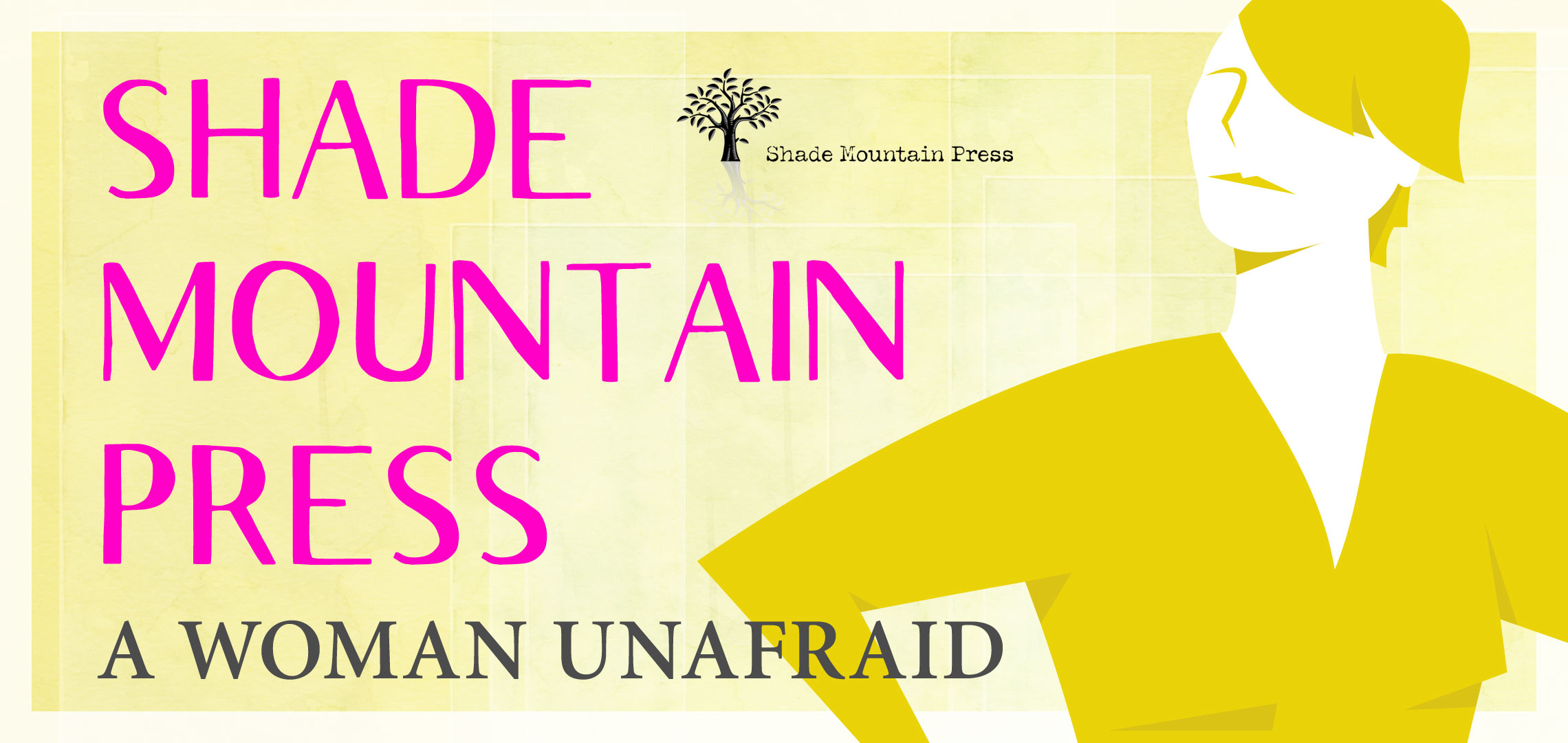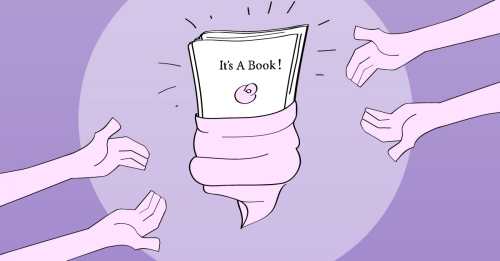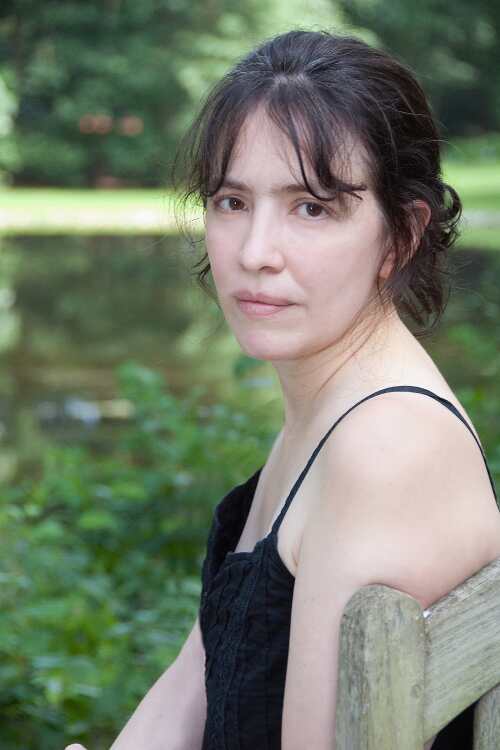A Woman Unafraid: Rosalie Morales Kearns

Women who write have to contend with dual challenges: the condescending perception that women require and receive special treatment from editors and publishers, and the reality that they are still massively underrepresented at most presses. Rosalie Morales Kearns, whose background includes freelance copy-editing and teaching creative writing courses, is the founder of Shade Mountain Press and also a gifted author. While researching publishers for her own work, she was reminded of the enormity of the feminist’s task, and her response went beyond the personal: she decided to become a part of the solution.
Thus was born Shade Mountain Press, a one-woman publishing vehicle determined to release books from women whose voices otherwise might go unheard. Its mission is distinctly feminist, and the work that it puts out is noteworthy and superb. In our interview, Kearns discusses the background against which Shade Mountain Press works, some of the challenges it faces, and great titles from women that you should not miss.
First, the News

Not Everyone Thinks Your ’Baby’ is Beautiful: Your manuscript is finished? Congratulations. So what’s next? Foreword Reviews Associate Editor Michelle Schingler writes on the absolute necessity of finding a beta reader.

Punk Rock Librarian: She’s not like any librarian you’ve ever met! Read about Kyrsten Bean, a librarian who rocks and who works to inspire children in her community. It’s part of our Getting To Know Your Librarian series.
8 Books That Will Never Be Regifted: Add magic to the library of a loved one with these fantastic titles from our Winter Issue.
Holiday Book Haul: Enter to win stacks of books (all kinds, across genres) for your personal library!
Featured Reviews of the Week
White Eskimo by Stephen R. Bown. “Those enthralled by tales of Polar expeditions will find much to celebrate in this thrilling and well-paced biography.” Reviewed by Lee Polevoi.
The BackYard Orchardist by Stella Otto. “The science of growing fruit is complex, but Otto takes the mystery out of it.” Reviewed by Diane Prokop.
The Myths that Stole Christmas by David Kyle Johnson. “Johnson places Christmas in its proper historical context with intelligence and an appreciation for the enjoyment that holiday provides.” Reviewed by Michelle Anne Schingler.
Art of the Airport Tower by Carolyn Russo. “Devotees of art photography and aviation history alike will savor this unusual and well-researched book.” Reviewed by Rachel Jagareski.
Creating a Beautiful Mess by Ann Gadzikowski. “This must-read teaches parents how to embrace self-directed play as a joyous necessity for children.” Reviewed by Laura Mahon.
Rosalie Morales Kearns, Founder of Shade Mountain Press
Visitors to your website are greeted with a poke at Nathaniel Hawthorne’s complaint that women were “taking over the publishing industry.” What do you think is behind the false perception that women are more powerful, or present, in publishing than they are?

Rosalie Morales Kearns
It’s a good question—why have people been surprised to see just how underrepresented women are in literary fiction? Maybe some of us assumed that things were gradually getting better over time. Twenty years ago, I would go to the library to read the latest issues of the top literary journals, and feel dismayed by the male-heavy (sometimes all-male) contents pages. I also noticed how badly skewed book review coverage was, as well as the prestigious literary awards. But I sometimes felt like very few others cared about these disparities.
The Internet has made it easier to look at all those contents pages in a manner of minutes: to look at recent issues of, for example, the New York Times Book Review; to call up a list of award winners any time. And social media has made it easier for like-minded people to express our outrage at this situation. Of course huge props go to the organization VIDA: Women in Literary Arts for doing their counts and publicizing them year after year, despite how defensive editors were, especially at the beginning, in response to those statistics.
You founded Shade Mountain Press to give talented women writers a voice, or an outlet for their voices. Why is that such an important project?
There’s a lot of brilliant work out there that’s going unpublished. Shade Mountain Press is a one-woman operation on a shoestring budget, so I’m hoping that a lot of other presses will become more proactive about promoting women writers, including women writers of color and other women whose work we don’t see enough of, like women with disabilities and working-class women.
You’re funded via donations, and this summer exceeded your donation goals. Why do you think people are eager to support an enterprise like Shade Mountain Press?
Actually, the vast majority of donors were people who knew me or one of our authors. Of course, there are kind people out there who would be supportive of my press’s mission if they knew about it, but the challenge is how to reach them. I hope this gets easier as we build our reputation.
What do you look for when reading submitted manuscripts? Are there any upcoming titles you’re particularly excited about?
Emily Dickinson said that she recognizes poetry when, while reading it, “I feel physically as if the top of my head were taken off.” I know people quote this a lot, but it’s really true. I feel a physical sense of lift-off, for lack of a better word, when I read work that’s genuinely felt, that’s unafraid to express emotion and passion, that’s unafraid to be political, to be different. I love work in which the author clearly feels compassion for her characters, who helps the reader inhabit their particular world; it enlarges my spirit.
We’re publishing only one title in 2016 while I retool and prepare for 2017’s titles, and also work to get nonprofit status for the press and then pursue grants. Our 2016 title is Yi Shun Lai’s debut novel Not a Self-Help Book: The Misadventures of Marty Wu, and I’m excited about it for many reasons. The narrator, a very high-strung young Taiwanese-American woman, is keeping a diary that’s laugh-out-loud funny. It also gives a good sense of what it’s like to be an immigrant to the US at a very early age (the 1.5 generation), seemingly fitting in to US culture but having deep ties elsewhere—but feeling kind of like a foreigner in the “home” country too.
If you were asked to name the five most overlooked titles by women that should be on “must read” book lists, which would you choose?
One of the many accomplishments of early second-wave feminists was the recovery of brilliant books by women who had been neglected for decades, like Sarah Orne Jewett and Zora Neale Hurston. The feminist dystopic novel Herland by Charlotte Perkins Gilman was never even published till the 1970s. So I preface this list with the caveat that I would have more titles to add if only I could spend several years browsing used-book stores and perusing old literary journals.
I’ll start with four novels:
Free Enterprise, by Michelle Cliff. Set in the nineteenth century. The protagonist is a free black woman (an actual historical figure) who finances John Brown’s raid on Harper’s Ferry. Beautifully written, memorable, and intriguing.
Mariana, by Katherine Vaz. Another imaginative treatment of an actual historical figure, set in seventeenth-century Portugal. A very moving treatment of a woman’s spiritual/artistic development, breathtaking in its coverage of the entire span of her life.
Te trataré como a una reina, by Rosa Montero (the title translates as I’ll Treat You Like a Queen). Montero is a Spaniard; as far as I know this novel hasn’t been translated into English. The protagonist is an extremely overweight woman who works in Madrid as a bolero singer, and takes delicious revenge on a man who mistreats her.
Louisiana, by Erna Brodber. To truly appreciate this novel, it helps to have recently read Zora Neale Hurston’s ethnographic works on the Caribbean (Tell My Horse, Mules and Men) and to have at least a passing familiarity with Afro-Caribbean spiritual practices. Even at that, the narrative is difficult to understand and has to be read carefully. But it is one of the most brilliant novels I’ve ever read. A true masterpiece.
My fifth title is a poetry anthology:
A Formal Feeling Comes: Poems in Form by Contemporary Women, edited by Annie Finch. I don’t think you can read this without wanting to write poetry yourself.
What does the future look like for women in publishing?
I tend to be fatalistic, so I’ll just say I hope my pessimism is misplaced. And I have to say, the rise of social media is bringing out a lot of voices of people who want to see major, substantive changes in the publishing industry, and who are holding the industry gatekeepers accountable in ways that hadn’t happened before.
